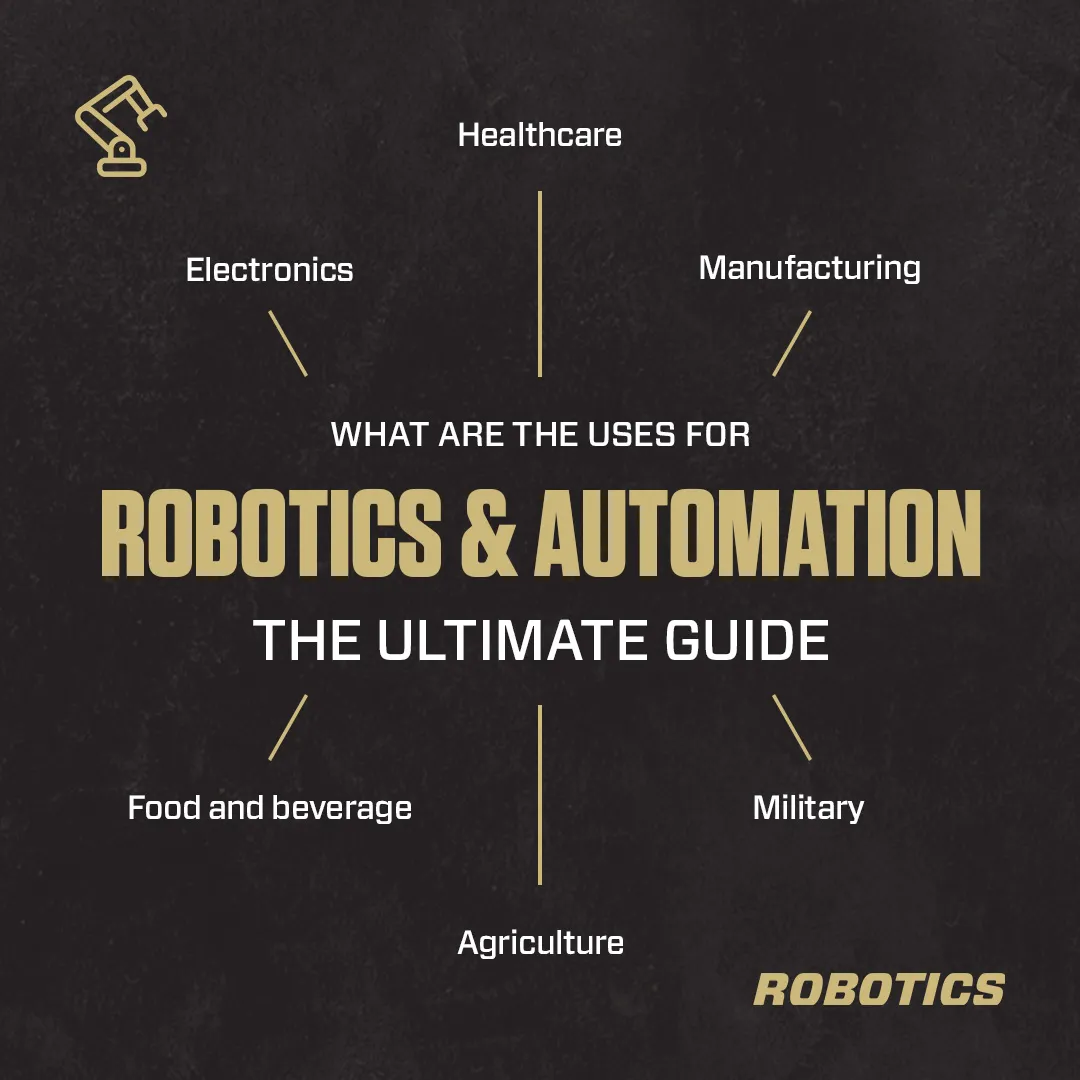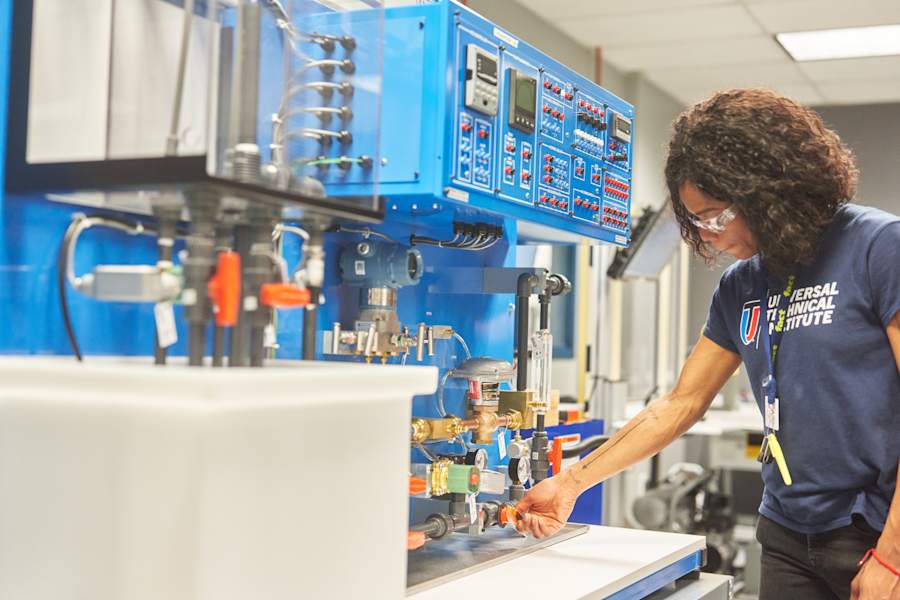How To Become a Robotics Technician
Robots help power diverse industries, from transportation to the military to manufacturing. Learn how you can train to become a robotics technician here!

Robotics and automation technicians are responsible for maintenance, repairs, diagnostics, troubleshooting and innovation in automation technology. It is an important industry that improves productivity in various fields.
If you're interested in cutting-edge manufacturing processes, you should learn everything you can about them. Robotics and automation technology is used in industries such as electronics, healthcare, manufacturing, food and beverage, agriculture and military.
Universal Technical Institute (UTI) offers a Robotics & Automation Technician training programfor aspiring technicians to learn using industry-standard equipment and develop the skills they need in the field. Graduates of UTI's program can use their knowledge and training to pursue entry-level positions in the industry! 1
Keep reading to learn more. In this blog post, we'll look at the robotics and automation trade and what it's like to become a technician in the industry.
Key Points:
- Robotics and automation technology is crucial in enhancing productivity across various industries, including electronics, healthcare, manufacturing, food and beverage, agriculture and military applications. This technology focuses on performing tasks with minimal human input, improving efficiency and reducing errors.
- Universal Technical Institute (UTI) offers a Robotics & Automation Technician program designed to equip students with the necessary skills to pursue entry-level positions in the field after graduation. The program includes hands-on training on industry-grade equipment and in-depth robotics and automation courses taught by experienced professionals.
- Robotics and automation technicians are responsible for maintenance, repairs, diagnostics, troubleshooting and innovation within the manufacturing industry and other sectors. Technical training is essential for developing the skills required to create, maintain and operate robotic solutions safely and securely.
- UTI's program covers key aspects of robotics and automation, including electrical circuitry and programming industrial robotic systems. Students benefit from both classroom and online instruction, as well as hands-on application in labs. UTI also provides career services to help graduates prepare for job opportunities.
Robotics is an interdisciplinary branch of computer science and engineering that focuses on the integration and operation of robots. Robots are machines that can automatically perform a complex series of actions. Automation is used in manufacturing and warehousing, including robotic manufacturing, to perform production processes with minimal human input.
Automation uses technology, programming and other processes to get machines to perform tasks with minimal need for human input. Robotics is one of the ways automation is used. While automation focuses on how to get machines to create certain outcomes, the goal of robotics is to design robots to perform specific tasks without the need for human mediation.
Robots in automation are intended to precisely perform tasks that are considered dull, dirty and dangerous. That’s because the algorithms it employs ensure consistency and reduce the possibility of error. Robots also have no biological limits and can operate for long periods of time, making them more efficient at their intended functions. Because robotic machines can be built to be highly durable and heavy-duty, they can handle more difficult and time-consuming tasks. They eliminate the potential hazards of tasks previously assigned to humans, such as lifting heavy loads, transporting noxious chemicals and many others.
Industrial automation and robotics have many potential applications. Several industries rely on robotics and automation to keep their operations up to modern performance standards, including:
Robotics and automation technicians may also be referred to as robotics technicians or automation technicians. They typically work in the manufacturing industry or the manufacturing sector of other industries like those listed above. Some of their primary duties and responsibilities include automation technology maintenance, repairs, diagnostics, troubleshooting and innovation.
Technical training can be beneficial for those looking to develop essential technical skills for the robotics and automation industries. With technological advancements, robotic solutions are increasingly finding their way into everyday processes at home and work. Aspiring technicians can learn how to create, maintain and operate these solutions safely and securely by enrolling in robotics and automation courses.
Universal Technical Institute offers robotics and automation technician training at campuses nationwide.1We provide comprehensive technical training in key aspects of robotics and automation through this program, with the main focus being on understanding automation processes. Our Robotics & Automation Technician program's courses cover the fundamentals of electrical circuitry, programming industrial robotic systems and more.
Along with classroom and online instruction, UTI’s robotics and automation students gain valuable hands-on training in our labs.
UTI also has a Career Services team that can help grads learn about and prepare for job opportunities. Alumni can use these resources for many years after graduation, even decades!
According to the Bureau of Labor Statistics (BLS), the median annual salary for robotics and automation technicians in the United States was $65,080 in May 2023.59 This means half earned more and half earned less. Keep in mind that salary depends on several factors, including experience, employer, demand and cost of living in the area.

Most of our grads start out working as technicians or in other entry-level roles. As with any industry, over time, they may be able to advance in their career with experience and hard work. Some entry-level and advanced roles could include:77
Entry level
Advanced
If this is a work environment that interests you, it could be a good career path to pursue.
Robotics and automation technicians often work alone or in small groups. If the machines they service are in use 24/7, they may be required to be on call around the clock, and they may work night and weekend shifts.
Because they’re frequently employed in manufacturing, robotics technicians and automation technicians often work in noisy environments. Some may be required to travel long distances to service technology on-site. This sensitive technology also often necessitates privacy and protection, resulting in most of their work being done indoors.
Training for a career in robotics and automation could be a great choice if you’re interested in learning more about these manufacturing processes.
At UTI, you can learn how to maintain and repair robotics systems from experienced automation professionals and develop key skills that could help you pursue a robotics and automation career after graduation.1
Request more informationto learn how UTI's robotics program can help you pursue your career goals if you want to work in this industry! Apply today to see where robotics and automation training can lead you.
Universal Technical Institute of Illinois, Inc. is approved by the Division of Private Business and Vocational Schools of the Illinois Board of Higher Education.